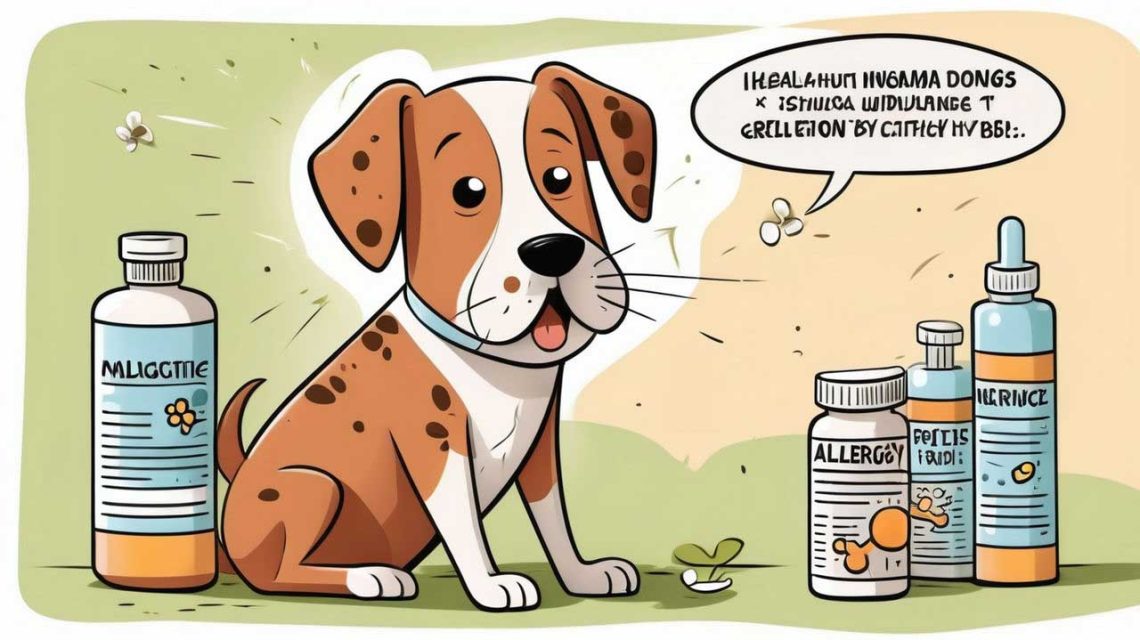Best Allergy Medicine for Dogs with Itchy Skin : Finding the Right Relief
As a dog owner, nothing is more heartbreaking than watching your furry friend scratch and itch constantly due to allergies. Whether it’s seasonal, environmental, or food-related, allergies can cause severe discomfort for dogs, leading to red, inflamed skin, hot spots, and even hair loss. Fortunately, there are effective treatments available to help ease your dog’s itchy skin and get them back to their playful, happy self.
In this article, we’ll explore the best allergy medicine for dogs with itchy skin, how these medications work, and what to consider when choosing the right option for your pet. By finding the best solution, you can help your dog feel comfortable again and protect them from further irritation.
Why Do Dogs Get Allergies?
Allergies in dogs can be triggered by several factors, and pinpointing the root cause is key to finding the right treatment. Here are the most common reasons your dog may be experiencing allergic reactions:
- Environmental Allergens: Pollens, dust mites, mold spores, and even grass can trigger seasonal or year-round allergies in dogs, leading to itchy skin and respiratory symptoms.
- Food Allergies: Some dogs are allergic to certain ingredients in their food, such as beef, chicken, dairy, or grains. Food allergies often cause itchy skin, especially around the ears, paws, and belly.
- Flea Allergies: Flea saliva can cause an allergic reaction known as flea allergy dermatitis, which leads to intense itching and skin inflammation, even after just one flea bite.
Regardless of the cause, itchy skin is a common symptom of dog allergies. It can range from mild discomfort to severe scratching that leads to open wounds or infections. That’s why addressing the allergy early with the right treatment is so important.
Signs Your Dog Has Allergies
Before diving into the best treatments, it’s important to recognize the signs of allergies in dogs. While itching is one of the most common symptoms, other signs to watch for include:
- Red, inflamed skin: Allergies can cause redness and irritation, particularly in areas like the paws, belly, and ears.
- Constant scratching or licking: If your dog is constantly scratching, licking, or biting their skin, this could indicate an allergic reaction.
- Hair loss: Excessive scratching can lead to bald spots or thinning fur.
- Ear infections: Recurring ear infections can be a sign of food or environmental allergies.
- Watery eyes or sneezing: Just like in humans, dogs can also experience respiratory symptoms due to environmental allergens.
If you notice any of these symptoms, it’s time to explore allergy treatments to relieve your dog’s discomfort.

Top 7 Best Allergy Medicines for Dogs with Itchy Skin
There are various allergy medications available that can help relieve itchy skin in dogs. Here are the top options that vets often recommend for safe and effective relief:
1. Apoquel
Apoquel is one of the most popular prescription medications for managing itching caused by allergic skin conditions. It works by targeting the specific pathways that trigger itching and inflammation in your dog’s immune system.
- Key Benefits:
- Provides fast relief, often within 4 hours.
- Safe for long-term use in dogs over 12 months old.
- Targets itching and inflammation without suppressing the entire immune system.
2. Cytopoint
Cytopoint is an injectable medication that works by blocking the specific proteins responsible for itching in allergic dogs. This treatment provides long-lasting relief and can be effective for 4 to 8 weeks.
- Key Benefits:
- Reduces itching within 24 hours.
- Lasts for 4 to 8 weeks per injection.
- Safe for long-term use in dogs of all ages.
3. Benadryl (Diphenhydramine)
Benadryl, an over-the-counter antihistamine, is often used to treat mild allergy symptoms in dogs, such as itching caused by environmental allergens or insect bites. It works by blocking histamines, which are chemicals released by the immune system during an allergic reaction.
- Key Benefits:
- Effective for mild allergic reactions and itching.
- Over-the-counter and affordable.
- Safe for most dogs when given in the proper dosage (always check with your vet first).
4. Zyrtec (Cetirizine)
Zyrtec is another antihistamine that’s safe for dogs and can help reduce allergic itching. It’s a non-drowsy option, making it ideal for dogs that need allergy relief without the side effects of drowsiness.
- Key Benefits:
- Non-drowsy formula, so your dog remains active.
- Effective for treating environmental and seasonal allergies.
- Available over-the-counter.
5. Hydrocortisone Cream
For localized itching and inflammation, hydrocortisone cream can be applied directly to affected areas to reduce redness and swelling. It’s a good option for dogs with hot spots or isolated areas of irritated skin.
- Key Benefits:
- Provides targeted relief for itchy spots.
- Over-the-counter and easy to apply.
- Helps reduce skin inflammation and irritation.
6. Claritin (Loratadine)
Claritin, another popular antihistamine, is often recommended for treating allergies in dogs. It’s a non-drowsy option and works well for reducing itching due to environmental allergens.
- Key Benefits:
- Non-drowsy, so your dog stays alert and active.
- Effective for seasonal allergies.
- Over-the-counter, making it an easy solution.
7. Omega-3 Fatty Acids
Omega-3 supplements, often derived from fish oil, are known for their anti-inflammatory properties. By adding Omega-3s to your dog’s diet, you can help reduce inflammation associated with allergies, promoting healthier skin and a shinier coat.
- Key Benefits:
- Natural anti-inflammatory that supports skin health.
- Helps reduce itchiness and improves coat condition.
- Can be used as a long-term supplement for ongoing allergy relief.
How to Choose the Best Allergy Medicine for Your Dog
When choosing the right allergy medicine for your dog, several factors need to be considered, including the severity of the allergies, your dog’s overall health, and any other medications they might be taking. Here are some tips to help you make the best decision:
- Consult Your Veterinarian: Always consult your vet before starting any new medication, even over-the-counter ones like Benadryl or Zyrtec. Your vet can help you determine the right dosage and treatment plan based on your dog’s specific needs.
- Identify the Allergy Source: Understanding the underlying cause of your dog’s allergies is key. If it’s seasonal or environmental, antihistamines might work well. However, if the allergies are food-related or caused by fleas, your vet may recommend a different course of treatment.
- Consider Long-Term Solutions: If your dog suffers from chronic allergies, treatments like Apoquel or Cytopoint may provide better long-term relief compared to antihistamines or creams, which are usually more effective for short-term flare-ups.
- Monitor for Side Effects: While most allergy medicines for dogs are safe, some may cause side effects like drowsiness or digestive issues. Always keep an eye on your dog after starting a new treatment and report any concerns to your vet.
Home Remedies and Additional Tips for Managing Itchy Skin
In addition to medication, there are a few home remedies and tips that can help manage your dog’s itchy skin:
- Regular Baths: Using hypoallergenic or medicated shampoos can soothe irritated skin and remove allergens like pollen or dust.
- Flea Control: If fleas are causing your dog’s itching, use flea prevention products regularly to keep them away.
- Dietary Changes: Sometimes, switching to a limited-ingredient or hypoallergenic diet can reduce food allergies and skin irritation.
- Humidifiers: Adding a humidifier to your home can help reduce dry skin, which can contribute to itching, especially in colder months.
By combining these tips with the right medication, you can help keep your dog’s skin healthy and itch-free.
FAQs About Allergy Medicine for Dogs with Itchy Skin
Can I give my dog Benadryl for itching?
- Yes, Benadryl is commonly used to treat mild allergies in dogs. However, you should always consult your vet to ensure the correct dosage.
How long does it take for allergy medicine to work in dogs?
- Some medications, like Apoquel, work within hours, while others may take a few days to show improvement.
What can I give my dog for immediate relief from itching?
- For fast relief, you can use antihistamines like Benadryl or topical hydrocortisone creams. However, for more severe cases, consult your vet for stronger options.
Are there natural remedies for dog allergies?
- Yes, Omega-3 fatty acids and regular baths with hypoallergenic shampoos can help reduce inflammation and itching naturally.
Can food allergies cause itchy skin in dogs?
- Yes, food allergies can lead to itchy skin, especially around the ears, paws, and belly. A food trial with a hypoallergenic diet may be recommended.



 Best Allergy Medicine for Dogs with Itchy Skin
Best Allergy Medicine for Dogs with Itchy Skin